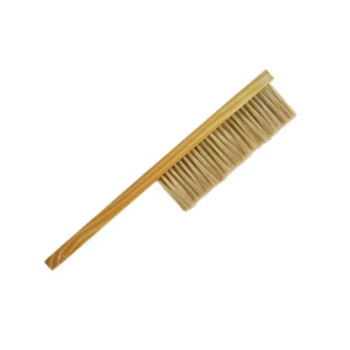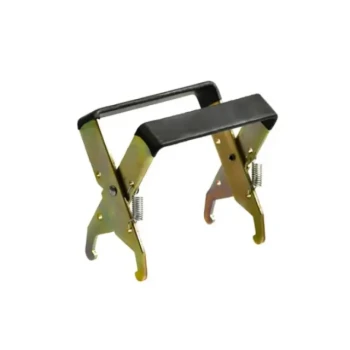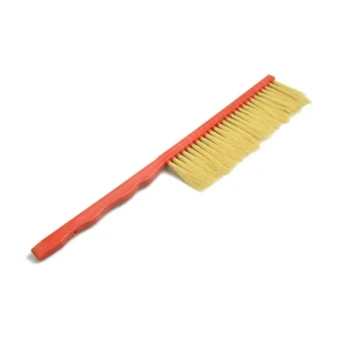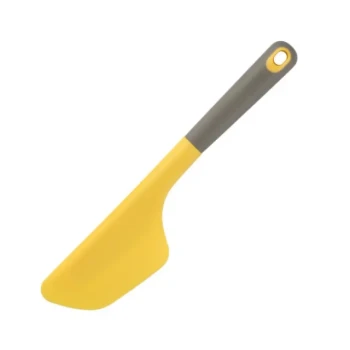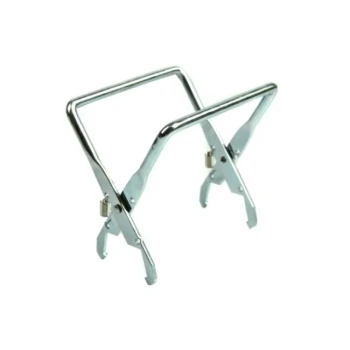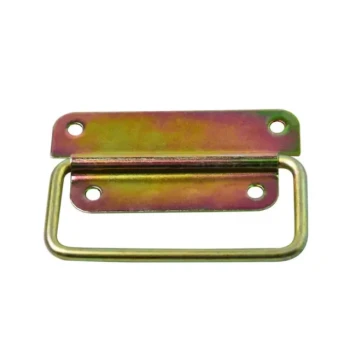At its core, plastic foundation differs from beeswax foundation in that it is an artificial, scentless structure, whereas beeswax is a natural hive product with a scent and texture that bees instinctively recognize and accept. This fundamental difference in origin drives significant variations in how bees interact with the foundation and how a beekeeper must manage the hive.
The decision between plastic and beeswax foundation is a classic trade-off: choosing the bees' natural preference and rapid acceptance (beeswax) versus the beekeeper's need for durability, longevity, and ease of management (plastic).
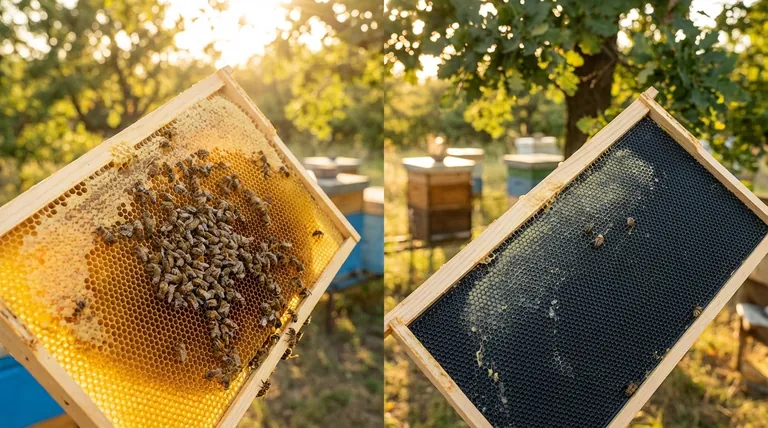
The Core Difference: Acceptance and Instinct
The most immediate impact of your foundation choice is how quickly your bees begin their work of drawing comb. This is driven by natural scent and texture.
Beeswax: The Natural Blueprint
Beeswax foundation is made from the very material bees produce to build their home. It emits a natural, sweet scent that bees find highly attractive.
This familiar scent and texture signal to the bees that the foundation is a safe and suitable place to begin construction, leading to faster and more enthusiastic comb-building.
Plastic: An Artificial Substitute
Pure plastic foundation is completely foreign to bees. It lacks the natural scent cues they rely on.
Consequently, bees can be very reluctant to work on plain plastic. They may ignore it, take a long time to start building, or refuse to draw comb on it at all, slowing colony development.
The Hybrid: Wax-Coated Plastic
To bridge this gap, most plastic foundation sold today comes with a thin coating of beeswax.
This hybrid approach attempts to provide the scent trigger that encourages acceptance while retaining the structural benefits of a rigid plastic core. While generally more accepted than plain plastic, the acceptance rate can still be slower than with pure beeswax.
Beyond Acceptance: Durability and Hive Dynamics
While beeswax is preferred by bees, plastic offers significant practical advantages for the beekeeper, influencing everything from honey extraction to pest control.
The Strength and Longevity of Plastic
Plastic foundation is exceptionally durable. It is rigid and far less likely to break or warp during hive inspections or in a honey extractor.
It can be cleaned and reused for many seasons, making it a cost-effective long-term investment. Plastic is also impervious to pests like wax moths and mice, which can devastate stored beeswax combs.
The Delicate Nature of Beeswax
Beeswax foundation is more fragile. It can be easily damaged during handling and is particularly vulnerable to blowouts in the extractor if not fully supported.
Without proper storage, beeswax is a primary target for wax moths, which can quickly destroy an entire set of frames.
Hive Communication and Vibrations
Bees communicate complex information through vibrations, most famously in their "waggle dance."
Beeswax, as a natural medium, effectively transmits these vibrations throughout the hive. Some evidence suggests that the rigidity of plastic foundation may dampen these vibrations, potentially hindering intra-hive communication.
Understanding the Trade-offs
Neither option is perfect. Your choice depends on what you are willing to sacrifice: the bees' natural inclination or the beekeeper's convenience.
The Price of Durability
Choosing plastic provides strength, reusability, and pest resistance. However, you introduce an artificial material into the hive and may need to provide extra encouragement, such as sugar syrup spray, to ensure the bees accept the foundation.
The Labor of a Natural Hive
Opting for pure beeswax aligns with the bees' natural instincts, often resulting in faster comb production and a more natural hive environment. The trade-off is the need for more careful handling, vulnerability to pests, and a shorter functional lifespan for each sheet.
Making the Right Choice for Your Goal
Your beekeeping philosophy and operational goals should guide your decision.
- If your primary focus is natural beekeeping and rapid colony growth: Pure beeswax foundation is the superior choice, as it encourages the fastest acceptance and work from the bees.
- If your primary focus is durability, cost-effectiveness, and ease of management: Wax-coated plastic foundation is the most practical option, especially for honey extraction and long-term use.
- If you want a balance of both: Many beekeepers use a mix, establishing a brood box with natural beeswax and using durable plastic frames in the honey supers.
Ultimately, the best foundation is the one your bees will build on, so understanding their natural preferences is the key to a productive hive.
Summary Table:
| Feature | Beeswax Foundation | Plastic Foundation |
|---|---|---|
| Material Origin | Natural hive product | Artificial, synthetic |
| Bee Acceptance | High (instinctive, scented) | Low (requires wax coating) |
| Durability | Fragile, prone to damage | Highly durable, reusable |
| Pest Resistance | Vulnerable to wax moths/mice | Impervious to pests |
| Hive Communication | Excellent vibration transmission | May dampen vibrations |
| Lifespan | Shorter, needs replacement | Long-term, cost-effective |
Ready to optimize your apiary with the right foundation? At HONESTBEE, we supply durable, wax-coated plastic foundations and natural beeswax options tailored for commercial apiaries and distributors. Our wholesale-focused operations ensure you get high-quality, cost-effective beekeeping supplies that balance bee health with operational efficiency. Contact us today to discuss your needs and boost your hive's productivity!
Visual Guide
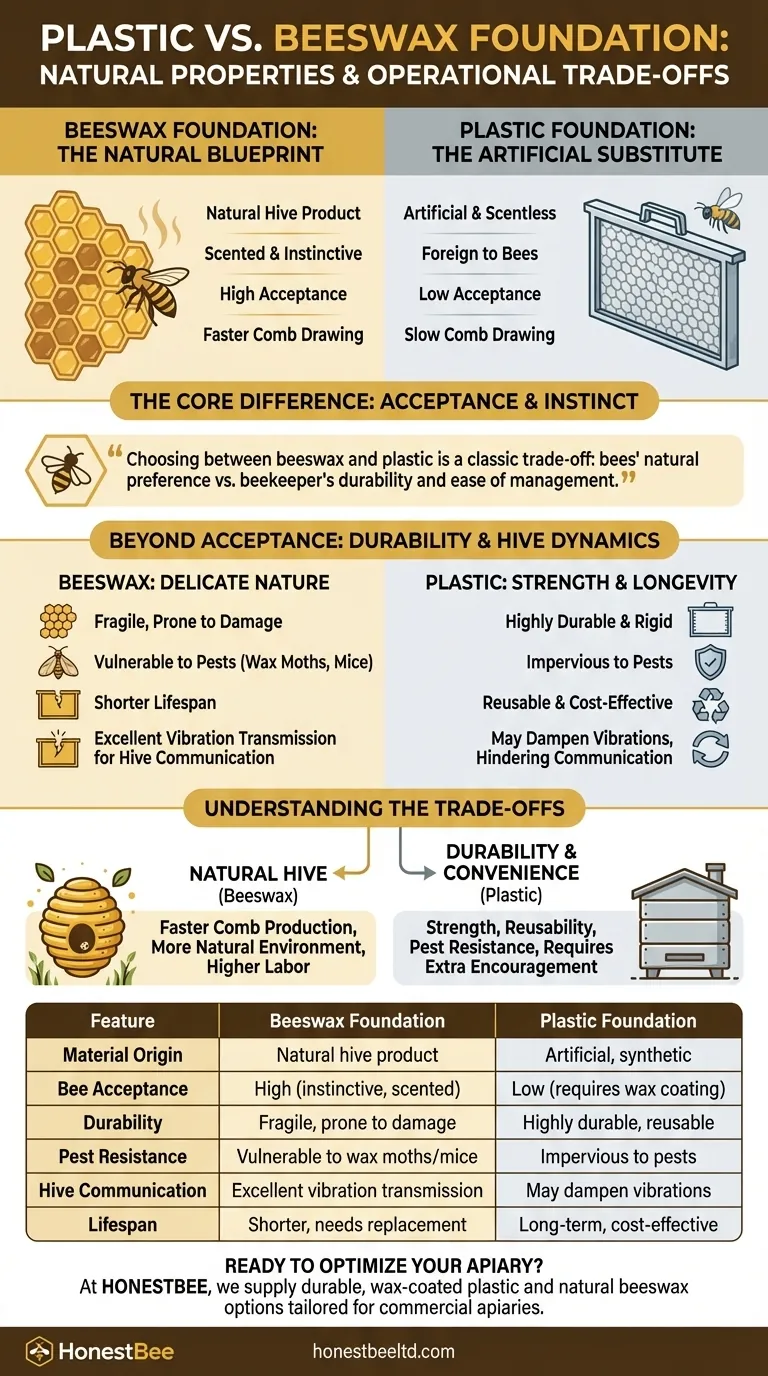
Related Products
- Food Grade Plastic bee Foundation for Bee Frames
- Notebook Style Beeswax Foundation Mould Wax Foundation Mold
- Beeswax Foundation Sheets Beehive Foundation for Wholesale
- Manual Beeswax Comb Foundation Machine Wax Foundation Mill Embossing Machine
- Professional Frame Preparation: The HONESTBEE Electric Wire Embedder
People Also Ask
- What are the disadvantages of using plastic beehive frames? 3 Hidden Challenges You Need to Know
- What material is used to construct the partially-formed honeycomb in these specialized frames? BPA-Free Plastic Safety
- Why is heavy waxing important for plastic foundation? Ensure Rapid, Uniform Comb Building
- What are the technical advantages of using Plastic Foundation in beekeeping? Standardize Your Colony Data Collection
- What are the benefits of using plastic foundation when replacing or repairing comb? Boost Hive Efficiency & Honey Yield
- Do you have to put wax on plastic foundation? The Key to Consistent Comb Building Success
- What are the benefits of using beeswax-coated plastic foundations? Boost Hive Efficiency and Durability
- Why is plastic foundation recommended when using an extractor to harvest honey? Ensure Structural Integrity for Efficient Harvesting







